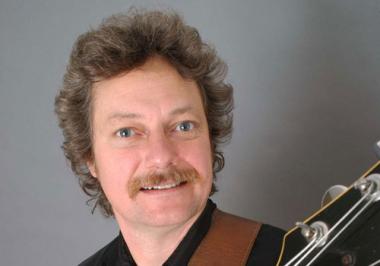Walk into Carmelina’s in Hadley any Friday night, and you’re likely to find the restaurant’s usual trappings: scurrying servers, a bartender standing in front of gleaming bottles, and loads of diners queueing up for alfredo in the low-lit cool. But for a while, there’s been an interesting addition: where once the sounds of jazz piano filled the air, you can now catch the strains of a solo jazz guitarist.
For musicians, restaurant gigs can be a beautiful thing: people are generally there to eat and chat, and listening is a passive addition to the proceedings. It’s often a relaxed atmosphere in which to try new things without the pressure of intense scrutiny. Jay Messer, however, is the kind of solo performer whose talents can easily withstand that sort of scrutiny, whether he’s playing tunes new or old.
There is little in the musical world that’s more demanding than solo jazz guitar. The guitar is an incredibly versatile instrument, of course, but when it comes to solo playing, there are major challenges, no matter the approach. That’s why there simply aren’t that many guitarists who make a living as solo instrumentalists. Many of the ones who do such work play within the strictly prefigured confines of classical, or embrace exuberantly rhythmic styles like flamenco.
Solo jazz guitar usually demands the convergence of several things: rhythm, melody, and improvisation. It’s rather like juggling five objects—a lot of people do fine with three, but few manage the paradoxical combo of speedy forethought and meditative detachment required to keep five in the air. The same kind of mental state is required of a good solo jazz guitarist. As Mitch Seidman wrote in liner notes for Jay Messer, “Not only is your musical train of thought and instrumental ability completely exposed, but there is also no interplay with other instruments to help ‘keep the ball in the air.’ … Everything you play is obvious.”
The perils are many: start a tune with a walking bass line coupled with simultaneous attention to melody on the top strings, and all might be fine until you get to the part of the tune that demands an improvised solo. Do you abandon the bass line in favor of high-note runs? Do you play a few notes at once, trying to split the difference and keep listeners reminded of the chord progression while carrying on some sense of melody? Such questions just keep arriving, and navigating them while reliably entertaining listeners is not for the faint of heart.
Messer is not alone in managing that equation—Valley guitarist Zack Danziger is also a standout in this rarefied realm—but he is particularly masterful. Ignore the alfredo for a while at Carmelina’s and lend Messer an ear, and you’ll hear astounding things. He employs all sorts of tricks of the trade, from playing chords whose top notes carry a melody to walking bass notes a la jazz guitar great Joe Pass. His transitions from single note leads to fast-moving chords sound effortless, like a tune was simply meant to go that way. When he punctuates a melody with a well-placed chord or two, it sounds like perfect happenstance.
Such things are the product of many years of playing, and Messer, who makes a living with his guitar, has been at it since the ’70s, solo and otherwise. On the heels of a recent solo recording called Concentration, Messer is releasing a new disc, Sly Exit, with a full quintet that includes Rob Faulkner (flugelhorn), Paul Lieberman (tenor sax and more), Dave Santoro (bass) and Hamir Atwal (drums). His Gibson archtop playing shines, offering a deftly played center amid the quintet’s driving tones.
There are plenty of chances to see Messer solo—he appears this week at Carmelina’s (Aug. 26), The Federal (Aug. 27)and E.B.’s (Aug. 25) in Agawam, and the Hazard Grill (Aug. 31) in Enfield, Conn. The quintet plays a CD release party Sept. 20 at School Street Bistro in Westfield. For more, visit jaymesser.com. For CDs, visit that site, Amazon.com or CDBaby.com.



